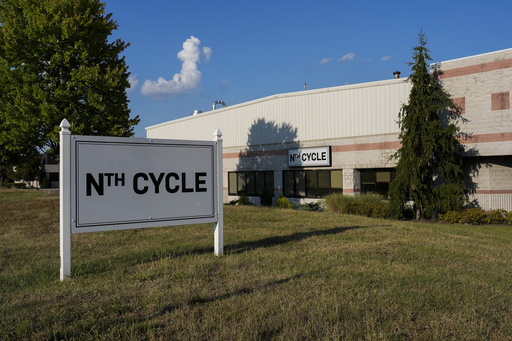
A new plant in Fairfield, Ohio, is set to open on Monday, marking a significant advancement in efforts to gather essential metals needed for combatting climate change. This plant specializes in extracting nickel and cobalt from scrap material, which will then be utilized in producing new batteries and supporting other clean energy markets. This innovative approach of extracting metals from recycled materials helps to mitigate the environmental impact associated with traditional mining practices and prevents these valuable resources from being wasted in landfills.
Many experts view this shift towards recycling metals from scrap material as the future, even though it may take several decades to fully materialize. The primary causes of climate change stem from burning fossil fuels to generate electricity and power vehicles. Batteries have the potential to serve as alternatives for both applications, however, the transition is still in its early stages and the demand for minerals remains high.
Nth Cycle, a metals refining company, is at the forefront of this movement, developing systems that can extract nickel and cobalt from shredded lithium-ion batteries and scrap from electric vehicles and consumer electronics. Other companies such as Redwood Materials and Li-Cycle are also contributing to the growth of the battery recycling industry in the United States.
Currently, most battery materials collected for recycling in the U.S. are shipped overseas for refining. Traditional metals refineries in the U.S. can cost billions of dollars to build, but Nth Cycle’s modular design presents a cost-effective solution that can be integrated into existing manufacturing facilities.
Megan O’Connor, CEO of Nth Cycle, expressed enthusiasm about being the first commercial cobalt nickel refinery in the U.S., highlighting the significance of establishing domestic refining capacity for these materials. This development has garnered praise from experts in the field, emphasizing the positive impact it could have on the battery industry and the overall sustainability of critical mineral supplies.
Amidst the increasing electrification of the world, the demand for critical minerals like nickel and cobalt is skyrocketing. With the surge in electric vehicle adoption, the need for these minerals has substantially grown, underscoring the importance of developing a robust domestic supply chain to support sustainable battery production in the U.S.
The Inflation Reduction Act is playing a pivotal role in incentivizing the expansion of the battery supply chain within the United States. Nth Cycle, for instance, received $7.2 million in funding through the law’s Advanced Energy Project Tax Credit (48C) program, which aims to promote the use of domestically sourced battery materials in electric vehicles. By strengthening domestic processes for mineral extraction and battery production, the U.S. can enhance its energy sustainability goals and reduce reliance on international supply chains that may be vulnerable to geopolitical conflicts and emissions.
